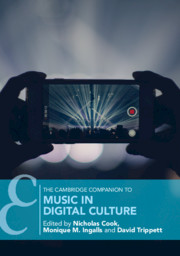Book contents
- The Cambridge Companion to Music in Digital Culture
- Cambridge Companions to Music
- The Cambridge Companion to Music in Digital Culture
- Copyright page
- Contents
- Figures
- Contributors
- Acknowledgements
- Introduction
- 1 Digital Technology and Cultural Practice
- Personal Take: Whatever Happened to Tape-Trading?
- 2 Toward a History of Digital Music: New Technologies, Business Practices and Intellectual Property Regimes
- Personal Take: On Serving as an Expert Witness in the ‘Blurred Lines’ Case
- 3 Shaping the Stream: Techniques and Troubles of Algorithmic Recommendation
- Personal Take: Being a Curator
- Personal Take: Can Machines Have Taste?
- 4 Technologies of the Musical Selfie
- Personal Take: Vaporwave is Dead, Long Live Vaporwave!
- 5 Witnessing Race in the New Digital Cinema
- Personal Take: Giving History a Voice
- 6 Digital Devotion: Musical Multimedia in Online Ritual and Religious Practice
- Personal Take: Technicians of Ecstasy
- Personal Take: Live Coded Mashup with the Humming Wires
- Personal Take: Algorave: Dancing to Algorithms
- 7 Rethinking Liveness in the Digital Age
- Personal Take: Augmenting Musical Performance
- Personal Take: Digital Demons, Real and Imagined
- Personal Take: Composing with Sounds as Images
- Personal Take: Compositional Approaches to Film, TV and Video Games
- 8 Virtual Worlds from Recording to Video Games
- 9 Digital Voices: Posthumanism and the Generation of Empathy
- Personal Take: In the Wake of the Virtual
- 10 Digital Inequalities and Global Sounds
- 11 The Political Economy of Streaming
- Bibliography
- Index
- References
2 - Toward a History of Digital Music: New Technologies, Business Practices and Intellectual Property Regimes
Published online by Cambridge University Press: 30 August 2019
- The Cambridge Companion to Music in Digital Culture
- Cambridge Companions to Music
- The Cambridge Companion to Music in Digital Culture
- Copyright page
- Contents
- Figures
- Contributors
- Acknowledgements
- Introduction
- 1 Digital Technology and Cultural Practice
- Personal Take: Whatever Happened to Tape-Trading?
- 2 Toward a History of Digital Music: New Technologies, Business Practices and Intellectual Property Regimes
- Personal Take: On Serving as an Expert Witness in the ‘Blurred Lines’ Case
- 3 Shaping the Stream: Techniques and Troubles of Algorithmic Recommendation
- Personal Take: Being a Curator
- Personal Take: Can Machines Have Taste?
- 4 Technologies of the Musical Selfie
- Personal Take: Vaporwave is Dead, Long Live Vaporwave!
- 5 Witnessing Race in the New Digital Cinema
- Personal Take: Giving History a Voice
- 6 Digital Devotion: Musical Multimedia in Online Ritual and Religious Practice
- Personal Take: Technicians of Ecstasy
- Personal Take: Live Coded Mashup with the Humming Wires
- Personal Take: Algorave: Dancing to Algorithms
- 7 Rethinking Liveness in the Digital Age
- Personal Take: Augmenting Musical Performance
- Personal Take: Digital Demons, Real and Imagined
- Personal Take: Composing with Sounds as Images
- Personal Take: Compositional Approaches to Film, TV and Video Games
- 8 Virtual Worlds from Recording to Video Games
- 9 Digital Voices: Posthumanism and the Generation of Empathy
- Personal Take: In the Wake of the Virtual
- 10 Digital Inequalities and Global Sounds
- 11 The Political Economy of Streaming
- Bibliography
- Index
- References
Summary
The chapter historicises the economics of music in the current age of technological automation – from the invention of intellectual property to the implementation of lock-down technologies at the turn of the twenty-first century. The first section sketches the basic characteristics of music’s technological, legal and political economies. By the late twentieth century, the precarious markets for music – enclosed within large-scale cycles of boom and bust in the nineteenth century – had morphed into a relatively stable set of intersecting industrial networks, including print, radio and phonograph. The second section sketches a transition period for the music industry in the context of distributed digital networks that emerged after the Cold War, producing a disjuncture between practice and policy. The third section traces the dialectics of intellectual property regimes pertaining to digital rights management, arguing that a covert allomorphism of the law effectively disabled both technical and legal functionalities pertaining to music.
Keywords
- Type
- Chapter
- Information
- The Cambridge Companion to Music in Digital Culture , pp. 33 - 57Publisher: Cambridge University PressPrint publication year: 2019
References
For Further Study
- 9
- Cited by

